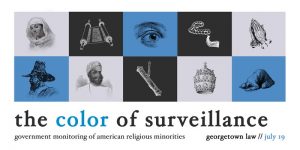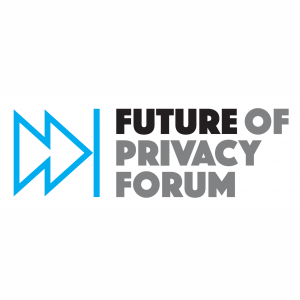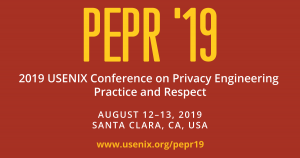Home
Use our global calendar of privacy events to locate an event near you.
FILTER BY

Across our country’s history – from the surveillance of the Separatists we now know as Pilgrims in 16th and 17th century England, to federal house raids and interrogations of early Mormons in the Utah Territory in the 19th century, to the 20thcentury surveillance of Jewish, Muslim, Quaker, and Sikh communities, to modern post-9/11 surveillance systems –government monitoring has long had a deep and disparate impact on American religious minorities.
The Color of Surveillance: Government Monitoring of American Religious Minorities will trace that history, and ask hard questions about what it means: Is modern surveillance consistent with the intentions of the American founders – or, for that matter, the events that precipitated the migration of English Separatists to the New World on the Mayflower? Do modern counterterrorism initiatives appropriately protect civil rights and civil liberties? How are local communities, advocates, and artists responding to these challenges?
Now in its third year, The Color of Surveillance, organized by the Center on Privacy & Technology at Georgetown Law, convenes academic, policy and government experts alongside local and community activists and artists. Prior speakers have included the Pulitzer-winning biographers of Martin Luther King, Jr. and W.E.B. DuBois, Guggenheim award-winning artists, and the general counsel of the Federal Bureau of Investigation.
Welcome & Introduction to The Color of Surveillance: Government Monitoring of Religious Minorities
8:45 – 9:00am
Dean William Treanor, Georgetown Law
Alvaro Bedoya, Center on Privacy & Technology at Georgetown Law
Elizabeth I to the Early 20th Century
9:00 – 10:15am
“Hunted”: 16th & 17th Century Surveillance of Pilgrims
John Coffey, University of Leicester
Is the United States a Christian Nation?
Brooke Allen, Bennington College
“Mohammedan Barbarism”: The Campaign Against Early Mormons
J. Spencer Fluhman, Brigham Young University
The Military Intelligence Division and American Jews
Alvaro Bedoya, Center on Privacy & Technology at Georgetown Law
The FBI and the Moorish Science Temple of America
Sylvester A. Johnson, Virginia Tech
BREAK
10:15 – 10:30am
The 1960s to the Aftermath of 9/11
10:30 – 12:05pm
J. Edgar Hoover, Black Clergy, and Martin Luther King, Jr.
Lerone A. Martin, PhD, Danforth Center on Religion and Politics at Washington University in St. Louis
The Feeling of Being Watched: A Filmmaker’s Response
Assia Boundaoui, The Inverse Surveillance Project
Rabia Boundaoui
Xiangnong (George) Wang (moderator), Center on Privacy & Technology at Georgetown Law
Post-9/11 Watchlists
Hina Shamsi, ACLU National Security Project
Community Reflections
Members of the Center for Media Justice’s National Delegation of MASA Community Activists
LUNCH BREAK
12:05 – 1:00pm
Life in Affected Communities
1:00 – 2:45pm
A Conversation on Countering Violent Extremism
Faiza Patel, Brennan Center for Justice
Ayaan Dahir, Young Muslim Collective
Eric Rosand, The Prevention Project
William Braniff, START, University of Maryland
Alvaro Bedoya (moderator), Center on Privacy & Technology at Georgetown Law
“Mosque Crawlers” and the Raza and Hassan cases
Asad Dandia, NYU Graduate Student
Farhaj Hassan, Muslims United For Justice
Laura Moy (moderator), Center on Privacy & Technology at Georgetown Law
“If they should come for us”: A Poet’s Response
Fatimah Asghar
Renata Barreto (moderator), Center on Privacy & Technology at Georgetown Law
BREAK
2:45 – 3:00pm
Community Action
3:00 – 5:25pm
Organizing after Raza
Fahd Ahmed, DRUM – Desis Rising Up & Moving
Stopping the Digital Muslim Ban: A Case Study
Rachel Levinson-Waldman, Brennan Center for Justice
Natasha Duarte, Center for Democracy & Technology
Yolanda C. Rondon, American-Arab Anti-Discrimination Committee
Steven Renderos, Center for Media Justice
Harrison Rudolph (moderator), Center on Privacy & Technology at Georgetown Law
Organizing in Silicon Valley
Maya Berry, Arab American Institute
Michelle Miller, Coworker.org
Jameson Spivack (moderator), Center on Privacy & Technology at Georgetown Law
Organizing Locally
Brian Hofer, Oakland Privacy
Religious Surveillance and Intersectionality
Brandi Collins-Dexter, Color Of Change
“Stealth Wear”: An Artist’s Response
Adam Harvey
Closing Remarks
5:25 – 5:30pm
Reception to follow in Hart lobby
Speakers:
- Fahd Ahmed of Desis Rising Up and Moving, a grassroots organizer on the issues of racial profiling, immigrant justice, and police accountability
- Professor Brooke Allen of Bennington College, author of Moral Minority: Our Skeptical Founding Fathers, a New York Times notable book
- Poet Fatimah Asghar, author of If They Come For Us & co-creator of the Emmy-nominated web series Brown Girls
- William Braniff of the National Consortium for the Study of Terrorism and Responses to Terrorism (START), studies CVE and alternative counterterrorism approaches
- Filmmaker Assia Boundaoui, director of The Feeling of Being Watched, a “riveting” account (New York Times) of surveillance of a suburban Muslim community in the 1990s
- Professor John Coffey of the University of Leicester, a scholar of Tudor and Stuart-era surveillance of the Puritans we now know as Pilgrims
- Brandi Collins-Dexter of Color Of Change, a civil rights advocate on media, environmental justice, and economic issues
- Ayaan Dahir of the Minneapolis Young Muslims Collective, a Somali American youth leader and civil liberties advocate
- Asad Dandia, M.A. candidate in Middle Eastern Studies at New York University and plaintiff in the Raza v. NYPD case
- Natasha Duarte of the Center for Democracy & Technology, author of Mixed Messages: The Limits of Automated Social Media Analysis
- Professor Spencer Fluhman of Brigham Young University, author of “An ‘American Mahomet’: Joseph Smith, Mohammad, and the Problem of Prophets in Antebellum America”
- Artist Adam Harvey, creator of Stealth Wear, a clothing collection “inspired by traditional Islamic dress… reimagined in the context of drone warfare”
- Syed Farhaj Hassan, a Sergeant in the U.S. Army Reserve and lead plaintiff in the Hassan v. City of New York case
- Brian Hofer of Oakland Privacy and the Privacy Advisory Commission of the City of Oakland, an advocate for local anti-surveillance legislation
- Professor Sylvester Johnson of Virginia Tech’s Center for the Humanities, co-editor of The FBI and Religion: Faith and National Security before and after 9/11
- Rachel Levinson-Waldman of the Brennan Center for Justice, co-coordinator of the Immigrant Surveillance Working Group
- Professor Lerone Martin of the John C. Danforth Center on Religion and Politics, a scholar on the FBI’s mobilization of African American clergy to discredit Dr. Martin Luther King, Jr.
- Michelle Miller of coworker.org, leading facilitator of tech sector employee activism and mobilization
- Faiza Patel of the Brennan Center for Justice, author of an in-depth critique of federal CVE programs
- Steven Renderos of the Center for Media Justice, co-organizer of a grassroots petition to IBM opposing the company’s interest in ICE’s “Digital Muslim Ban”
- Yolanda Rondon of the American-Arab Anti-Discrimination Committee, a civil rights attorney critical of DHS surveillance initiatives
- Eric Rosand of the Prevention Project: Organizing Against Violent Extremism, a non-resident Senior Fellow at Brookings, and a former State Department senior CVE official
- Hina Shamsi of the American Civil Liberties Union, which is challenging watchlists as unfair and discriminatory


Future of Privacy Forum (FPF) invites you to join us on Friday, June 7th, 2019 for a roundtable discussion with Dr. Johnny Ryan, Chief Policy & Industry Relations Officer for Brave Software, to discuss The Future of Ad Tech – Emerging Business Models and Designing for Privacy.
Prior to joining Brave Software, Dr. Ryan was Head of Ecosystem for PageFair, and Chief Innovation Officer of The Irish Times. In recent years, he has been a prominent privacy advocate in the EU, working with digital rights organizations to file formal complaints with regulators in the UK, Ireland, Spain, the Netherlands, Belgium, and Luxembourg, related to advocates’ concerns about the Ad Tech industry and current real-time bidding (RTB) practices (read the primary regulatory complaint here). More recently, Dr. Ryan testified before the U.S. Senate Judicary Committee in a May 21st hearing, “Understanding the Digital Advertising Ecosystem and the Impact of Data Privacy and Competition Policy.” (Watch the hearing)
The discussion will be moderated by Stacey Gray, Senior Counsel at the Future of Privacy Forum.
We will discuss with the group:
- What does the future hold for alternative Ad Tech business models, including blockchain and attention-based models such as the Brave Attention Token (BAT)?
- What does engineering for privacy, or “privacy by design,” mean in the context of advertising technology?
- What’s on the horizon for Ad Tech in Europe?
- & any other questions you have — please feel free to send your questions ahead of time.
Lunch will be provided.
** Invitation only — Limit 1 per organization & non-transferable. **

Please join Charter Communications and the Future of Privacy Forum for a conversation with two leading members of Congress who will share their perspective on this important issue and potential legislative solutions.
This event will feature Rep. Jan Schakowsky, Chair and Rep. Cathy McMorris Rodgers, Ranking Member of House Energy and Commerce Subcommittee on Consumer Protection and Commerce.
A light breakfast will be served. Please email [email protected] to RSVP.

The USENIX Conference on Privacy Engineering Practice and Respect (PEPR) is a single-track conference focused on designing and building products and systems with privacy and respect for their users and the societies in which they operate. Our goal is to improve the state of the art and practice of building for privacy and respect and to foster a deeply knowledgeable community of both privacy practitioners and researchers who collaborate towards that goal.

For August, we’re thrilled that NIST will join us to share an updated draft of their Privacy Framework to seek feedback prior to its planned October 2019 release.
Join us at 6pm for networking. Program starts at 6:30pm.
Presenters include:
- Naomi Lefkovitz, Senior Privacy Policy Advisor and Lead, Privacy Framework, NIST
- Ellen Nadeau, Deputy Manager, Privacy Framework, NIST
The year 2019 may be a turning point for data privacy law. Privacy law in the United States is famously a hole-ridden patchwork of state laws, sectoral legislation, and consumer protection. Whether in response to the European Union’s General Data Protection Regulation or to California’s enactment of its Consumer Privacy Act, over this past year state and federal legislators have been proposing new data privacy laws at an energetic rate.
How will we govern the technology of the near future? Will the United States join the rest of the world in recognizing data privacy rights or will it take its own approach? Will these choices even matter in practice, given the long reach of both EU and California law?
This conference will bring together academics, practitioners, technologists, and regulators to discuss the near future of U.S. data privacy law. Specifically, we will explore municipal bans on surveillance technology, new state privacy laws, the future role of the Federal Trade Commission, and proposed federal legislation.
Those who cannot attend the event in person may also register for the free livestream.

The aim of the conference is to explore the practical implementation of EU data protection rules within the law enforcement sector and highlight some of the practical challenges that data protection experts face in light of developments in policing, society as a whole and a rapidly changing criminal environment.
The conference is organised by the Danish National Police and ERA in cooperation with Europol’s Data Protection Experts Network (EDEN) and will bring together internationally renowned practitioners from law enforcement and security authorities with privacy experts, academics and civil society representatives.
Key topics
- Data-sharing, GDPR and the police: how to fight crime in the age of GDPR?
- Passenger Name Record (PNR) data
- “Data protection by design” through legislation?
- Policing in the age of artificial intelligence (AI), open source intelligence (OSINT) and the Internet of Things: proportionality in an age of data abundance
Who should attend?
Law enforcement officials, data protection officers, members of Europol’s Data Protection Experts Network (EDEN), representatives of national data protection authorities, academics.

The Future of the COPPA Rule: An FTC Workshop will examine whether to update the COPPA Rule in light of evolving business practices in the online children’s marketplace, including the increased use of Internet of Things devices, social media, educational technology, and general audience platforms hosting third-party child-directed content. The COPPA Rule, which was enacted in 2000 and updated in 2013, requires certain Web site operators to obtain parental consent before collecting, using, or disclosing personal information from children under 13. Workshop topics will include:
- How the development of new technologies or business models, the evolving nature of privacy harms, and changes in the way parents and children use websites and online services, affect children’s privacy today;
- How the Rule should address parental consent for education technology vendors that collect personal information consented to by schools, following on discussions that occurred during the FTC’s Student Privacy and Ed Tech workshop in December 2017;
- Whether the Rule should include a specific exception to parental consent for audio files containing a child’s voice that website operators collect and then promptly delete;
- Whether the Rule should permit general audience platforms to rebut the presumption that all users of child-directed content are children, and if so, under what circumstances;
- Whether the revisions to the Rule made in 2013 have worked as intended or require modification; and
- Whether the Rule should be amended to better address websites and online services that do not include traditionally child-oriented activities, but that have large numbers of child users.
For a more detailed list of topics, see the Commission’s request for public comment on the COPPA Rule

